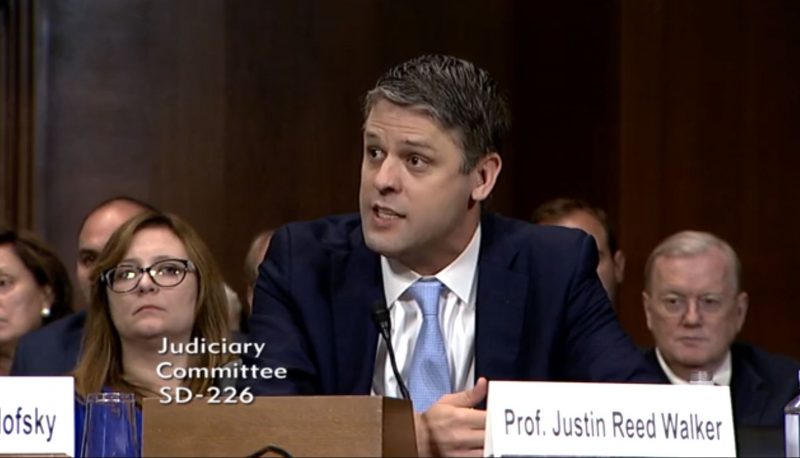“Confirmed Judges, Confirmed Fears” is a blog series documenting the harmful impact of President Trump’s judges on Americans’ rights and liberties and the need for the Senate to confirm President Biden’s federal court nominees to help counteract these effects . Supreme and appellate court cases in the series can be found by issue and by judge at this link.
Trump DC Circuit judge Justin Walker, joined by Trump judge Greg Katsas, struck down important segments of rules adopted by the National Highway Traffic Safety Administration (NHTSA) and the Environmental Protection Agency (EPA) that established fuel economy standards and pollution limits for the trailer portion of large tractor-trailers or semitrucks. Judge Patricia Millett agreed with the portion of the decision concerning the EPA rule, as to which she pointed out the agency has ready alternatives, but strongly dissented from the Trump judges’ ruling that vacated the fuel efficiency standards. The November 2021 decision was in Truck Trailer Manufacturers Ass’n. v. EPA.
Tractor-trailers, also known as semitrucks or eighteen-wheelers, transport large amounts of goods along America’s highways, and also consume large amounts of fuel and emit significant amounts of carbon dioxide and other greenhouse gases. In 2016, NHTSA and the EPA issued rules to require fuel emission standards and limit greenhouse gas emissions from such vehicles, including the trailer portions, pursuant to an Obama Administration effort to reduce the harmful effect of such heavy-duty vehicles on climate change. The trailer manufacturers challenged both sets of rules via a petition to the DC Circuit.
All three judges on the DC Circuit panel agreed that the EPA did not have the authority to regulate the trailer portion of tractor-trailers under the Clean Air Act, because the Act applies specifically to “self-propelled” vehicles, and trailers are propelled by the attached tractor or truck, not by themselves. The court pointed out that the EPA could achieve similar results by regulating the tractors, including the vehicles they can pull, or the tractor-trailer assemblers.
The panel seriously disagreed, however, on the NHTSA rules. Trump judge Walker’s opinion, joined by Trump judge Katsas, held that the part of the NHTSA fuel economy rule concerning trailers was also invalid. Even though they acknowledged that the term “vehicle” in the NHTSA statute was ambiguous, they claimed that the rule should be vacated as applied to trailers because trailers themselves do not “use fuel,” because other parts of the law refer to a “heavy-duty truck” rather than a “heavy-duty vehicle,” because the law purportedly excludes trailers since it refers to a commercial “on-highway vehicle” in terms of the vehicle’s “gross vehicle weight rating,” and because tractors or trucks are already vehicles before the trailers are hooked on.
Judge Millett firmly dissented from the decision on the NHTSA rules. She began by explaining that “[a]mple pre-existing and contemporary statutory provisions, regulations, dictionaries, and common understanding” all “firmly embrace trailers in their on-highway role” as “within the meaning” of “vehicle,” which is not otherwise defined in the NHTSA law, and that under basic principles of administrative law, the court should defer to the agency’s definition. She then answered each of Walker’s contrary arguments. Trailers themselves may not “use” fuel, she noted, but they clearly “consume” fuel, and a tractor-trailer consumes “substantially more fuel than the tractor alone,” so that regulating the aerodynamics and other aspects of trailers would “substantially increase overall fuel savings.” The fact that other parts of the law refer to “heavy-duty trucks,” Millett went on, does not in any way “exclude trailers,” especially in their “on-highway form as tractor-trailers.” The law’s reference to “gross vehicle weight rating,” she continued, is irrelevant because trailers “can also have” such ratings, and the context makes clear that Congress “swept in more vehicles, not fewer” into the law. And the fact that trucks are already vehicles on their own, Millett explained, is irrelevant to NHTSA’s authority to conclude that the combined “tractor-trailers are themselves vehicles.” Overall, Millett wrote, Walker’s attempt to “wring out” of the statute a prohibition on regulation of trailers “is illusory.”
The result of Trump judges Walker and Katsas’ invalidation of the NHTSA tractor-trailer rule, Judge Millett explained, will “materially impede” the achievement of the NHTSA statute’s goal of producing the “maximum feasible improvement in fuel efficiency for medium and heavy-duty vehicles on our roads. The result will inevitably be to harm our efforts to cut carbon emissions, save money, and boost energy security. It remains unclear whether further court or other action can counteract the votes of these two Trump judges. In any event, the case serves as an important reminder of the significance, as part of our fight for our courts, of the Senate confirming more fair-minded judges who will appropriately evaluate federal agency efforts to improve our health and welfare and not defer to private corporations.

